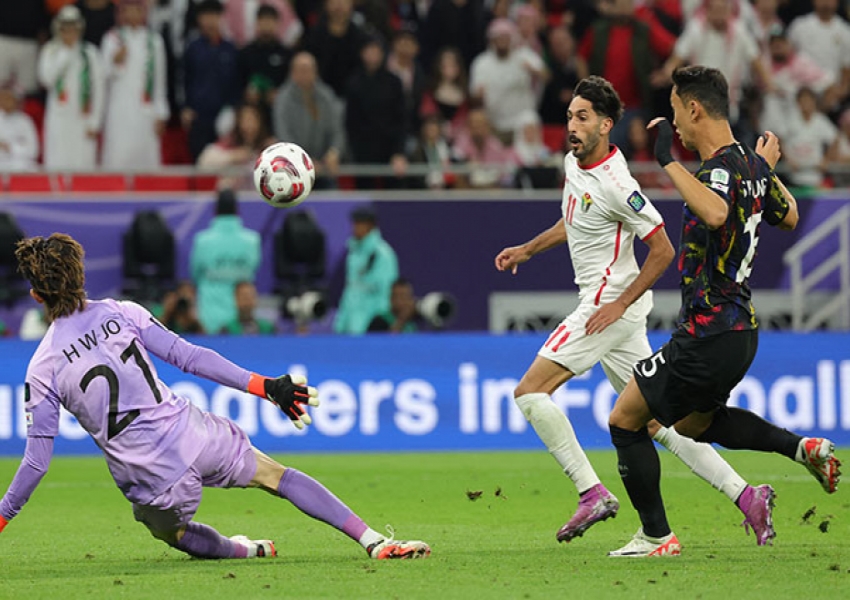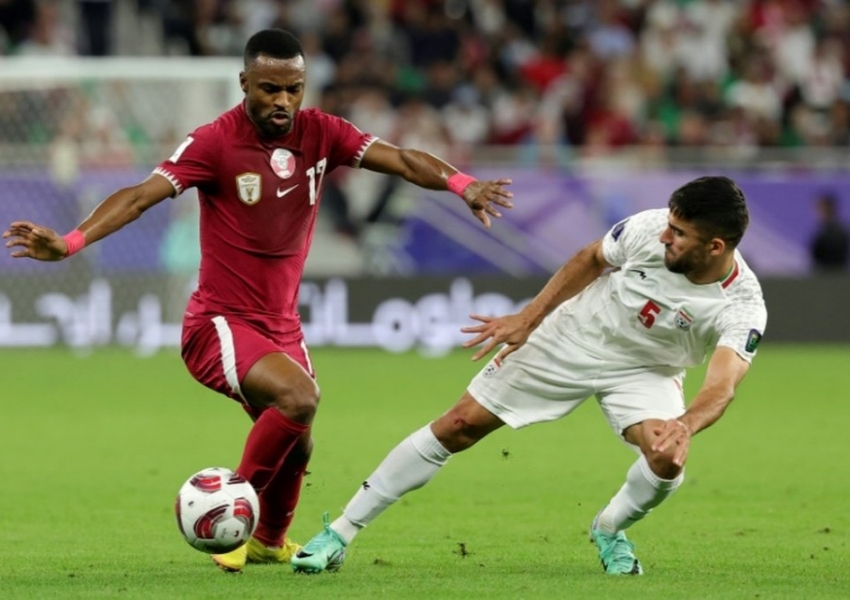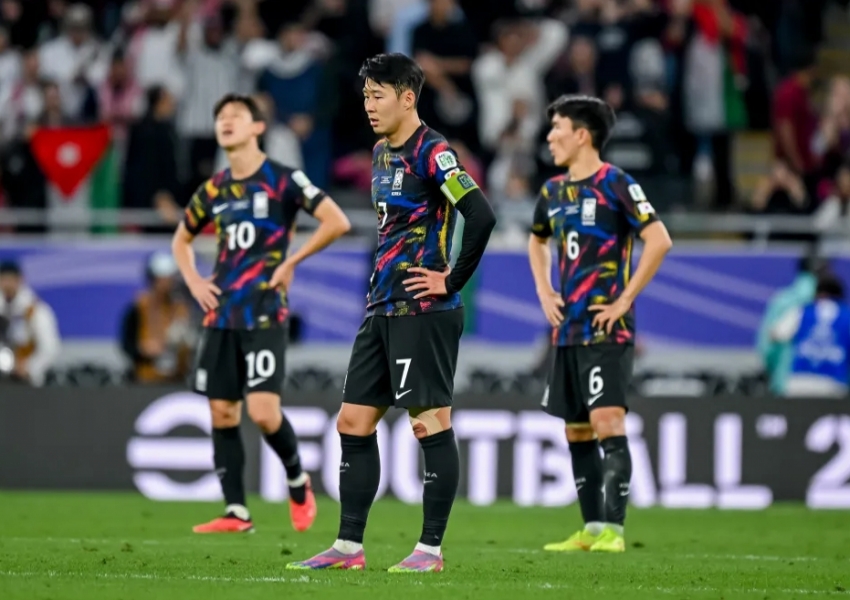Emphasizing Speed: The Tactical Similarities and Differences Between Jordan and Qatar, and the Future of Asian Football
The recent semifinals of the Asian Cup concluded with surprising outcomes: Jordan and Qatar, both underdogs, managed to eliminate top-tier Asian teams South Korea and Iran, respectively. The reactions of the core players from the losing teams, Son Heung-min and Sardar Azmoun, were telling. Son appeared bewildered, while Azmoun walked off the field with a nonchalant demeanor, as if the match had ended in a draw. This suggests that both South Korea and Iran accepted their defeats gracefully. This analysis delves into the strategies that led to the victories of Jordan and Qatar, examining their similarities and differences, and contemplating the potential shift in Asian football's power dynamics.

High Efficiency in Offensive Interceptions
Both Jordan and Qatar exhibited exceptional efficiency in intercepting the ball in advanced positions. South Korea, for instance, had already been dispossessed twice in their own half before conceding the goal to Jordan. Initially, Jordanian players seemed unprepared to capitalize on these turnovers, missing out on scoring opportunities. However, by the third interception, the Jordanian players had composed themselves, leading to a perfectly executed pass from Musa Al-Taamari and a delicate chip by Yazan Al-Naimat.

Iran, although not committing the same level of passing errors as South Korea, found themselves repeatedly dispossessed near their own penalty area. This constant pressure caused their defenders' alertness to fluctuate wildly, leading to psychological fatigue. Qatar’s second goal was a direct result of such a defensive lapse.

The primary reason for the frequent turnovers by South Korea and Iran was not inferior training but a lack of physical reserves due to prior intense matches. South Korea, having faced strong teams like Saudi Arabia and Australia, showed signs of exhaustion, particularly in the second half against Jordan. Defenders could barely keep up with Jordanian attackers, often resorting to last-ditch tackles. Similarly, Iran, having a historically tough record against Japan, expended significant energy to secure their quarter-final victory, celebrating as if they had won the Asian Cup itself, indicative of their exertion.
Tactical Variations: Pure Speed vs. Technical Speed
Despite both teams leveraging speed, Jordan and Qatar displayed distinct tactical approaches. Jordan's speed was raw and unadulterated, characterized by their blistering pace, both in terms of absolute speed and footwork. Their attackers could outpace defenders without relying on feints, exploiting open spaces with ease. This was evident in their victory over Iraq, achieved through sheer speed. However, against a more experienced South Korea, Jordan had to rely on subtle changes in pace during build-up plays to create scoring opportunities.
On the other hand, Qatar’s speed was more about their high pressing game in the final third. Upon regaining possession, Qatari players used frequent dribbles and feints to dismantle the opposition’s defense, showcasing a higher degree of technical prowess rather than sheer speed. The confidence displayed by Qatari players stemmed from their status as the reigning Asian Cup champions and the advantage of playing on home soil.
Physical and Psychological Fatigue
South Korea and Iran’s struggles can be attributed to physical and psychological fatigue from their previous matches. South Korea had battled through tough matches against Saudi Arabia and Australia, which left them physically drained. This fatigue was evident in their second-half performance against Jordan, where defenders could hardly keep up with the pace of the Jordanian attackers.
Similarly, Iran's encounters with Japan have historically been grueling. Despite Japan’s underwhelming performance in the quarter-finals, Iran did not take the match lightly. Their celebrations after defeating Japan resembled those of a team that had won the tournament, indicating the immense effort they had exerted. This exhaustion likely played a role in their inability to handle Qatar's relentless pressing.
Confidence and Experience
Another key difference lies in the confidence and experience of the players. Qatar's players displayed greater self-assurance, having already won the previous Asian Cup and playing on familiar turf. This confidence translated into more composed and technically proficient play, particularly in their high pressing and subsequent attacking maneuvers.
Jordan, while less experienced on the international stage, showed signs of growing confidence as the tournament progressed. Their ability to adapt their playstyle against different opponents indicates a maturation of their tactical approach. With continued progress, Jordan is likely to become a more formidable force in future tournaments.
Potential Shift in Asian Football
The success of Jordan and Qatar raises intriguing questions about the future of Asian football. Traditionally dominated by powerhouses like South Korea, Japan, and Iran, the landscape appears to be shifting. Qatar’s recent rise, culminating in their Asian Cup victory and subsequent strong performances, highlights the impact of substantial investment in football development. Their success story is a testament to the benefits of a well-structured football program, combining both talent nurturing and strategic management.
Jordan's emergence as a competitive team also signifies a potential change. Historically, Jordan has not been a major player in Asian football, but their recent performances indicate a significant improvement. Their ability to compete with and defeat traditional powerhouses suggests that the gap between the top and mid-tier teams in Asia is narrowing.
Conclusion: Implications for Future Tournaments
As the dust settles on this edition of the Asian Cup, the implications for future tournaments are clear. Teams like Jordan and Qatar have demonstrated that with the right mix of tactical acumen, physical preparedness, and psychological resilience, they can compete at the highest levels. Their successes will likely inspire other mid-tier teams in Asia to invest in their football programs, potentially leading to a more competitive and unpredictable landscape in the region.
For traditional powerhouses like South Korea and Iran, these results serve as a wake-up call. They will need to reassess their strategies, both in terms of match preparation and squad rotation, to ensure they can maintain their performance levels throughout the tournament. The emergence of new contenders will undoubtedly push these teams to innovate and improve, ultimately raising the overall standard of Asian football.
In conclusion, the victories of Jordan and Qatar in the Asian Cup semifinals underscore the evolving dynamics of Asian football. While speed remains a common weapon, the tactical nuances and strategic differences between the two teams highlight the diverse approaches that can lead to success. As the region's footballing landscape continues to shift, the future promises exciting and unpredictable competitions, with more teams capable of challenging for the top honors.
Copyright Statement:
Author: mrfootballer
Source: Mrfootballer
The copyright of this article belongs to the author. Reproduction is not allowed without permission.
Recommended Blog
- Four Pieces of Good News Boost Inter Milan's Perfect Lunar New Year: Is the Title Already in Hand? Actions Focus on the Future
- Serie A Round 24: Are Juventus Destined to Accept Their Fate? Udinese Faces Biggest Relegation Crisis of the Century
- Atletico Madrid Stirs Psychological Warfare Before Inter Clash: Simeone Laments Injustice, Reveals Battle Strategy
- Premier League Round 24: Dark Horse Dreams Fade as Arsenal and Manchester United Charge Forward
- Inter Milan Dominates Serie A's Big 7: 9 Wins, 1 Draw, and a Mysterious Halftime Communication
- La Liga Round 24: Real Madrid’s Defensive Shuffles and Real Sociedad’s Scoreless Streak
- Inter Milan’s Departing Hero: Klaassen’s Pure Desire Demonstrates Great Qualities
- Bundesliga Round 21: Dortmund Brewing a Big Win, Leipzig Can't Afford to Overlook Real Madrid
- Celebrating the Lunar New Year with Inter Milan's Trio of Joyous News: Post-Moratti Era Breakthroughs and Steering Away from Juventus
- Inter Milan's Crucial Visit to Madrid: Key Negotiations and Scouting Opportunities
Hot Blog
- Man City’s 21-Year-Old Star Returns Home as a Hero! Receives $350,000 Mercedes, Gifts It to His Father
- AFC Champions League Quarterfinal Draw: Yokohama Faces CR7! Two High-Stakes Clashes as Japan’s Duo Battle in the Bottom Half
- A Night of Triumph and Heartbreak: Barça’s Epic Comeback, Liverpool’s Cup Final Agony, and Leverkusen’s Stunning Reversal
- 175 Days on the Sidelines! Barça’s 32-Year-Old Guardian Dreams of a Champions League Comeback
- Barça Unleashed: 26-Minute, 4-Goal Comeback Stuns Atlético as Flick’s Masterclass Makes History
- Simeone’s 8 Days of Nightmare: Champions League Exit and Two La Liga Collapses
- Messi Turns Magician with Both Feet: A 3-Second Masterclass That Left Three Defenders Helpless
- From 0-2 to 4-2! Barça’s Miracle at the Metropolitano: Injury-Time Heroics Seal Stunning Comeback and La Liga Top Spot
- English Media: Manchester United Will Win Premier League Title in 2028! History Will Repeat Itself, Two Teams Serve as Inspirations
- 7 Players Dropped, 2 New Additions! China’s National Team Surprises with Key Reinforcements and a Full-Strength Squad